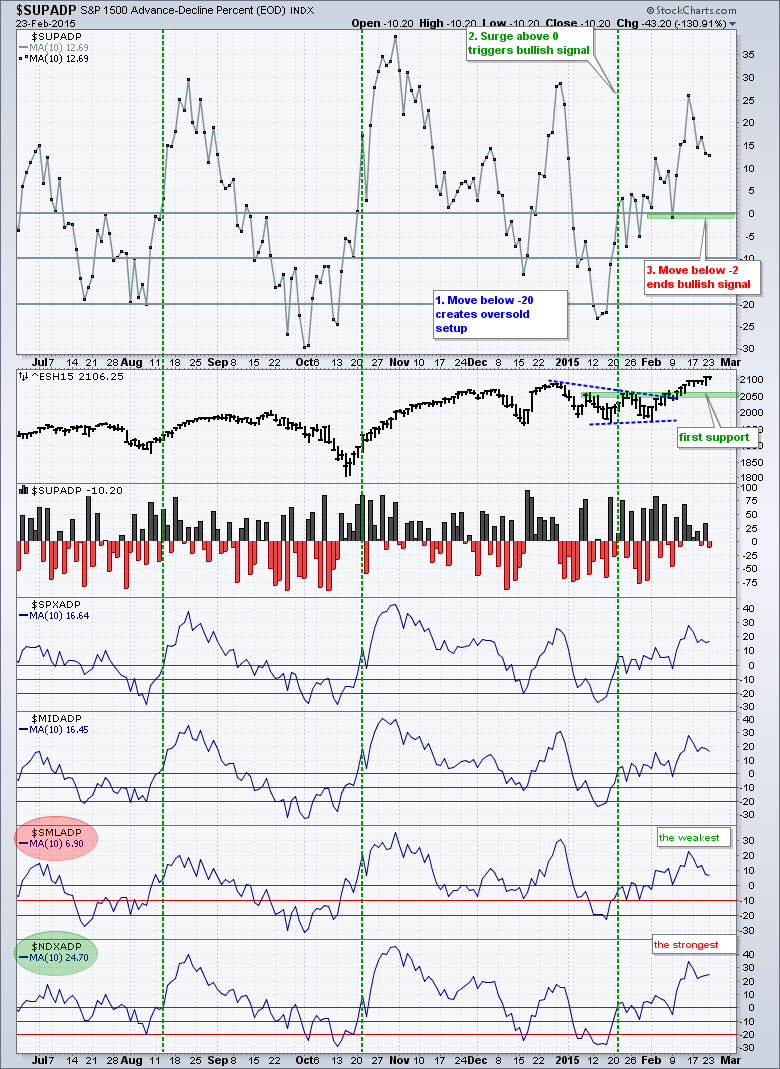There it is again! Stocks started the day weak as the S&P 500 dropped to the 2104 level in the first hour. After choppy trading most of the day, the index surged in the final hour and closed a whisker below 2110. Selling pressure remains muted and buying pressure is still the dominant force. The finance, industrials and energy sectors lagged with small losses. The healthcare, utilities and consumer staples sectors led with small gains. XLU is getting a bounce off a support zone. Even though QQQ closed fractionally higher, the Networking iShares (IGN), Cloud Computing ETF (SKYY), Semiconductor SPDR (XSD) and Internet ETF (FDN) finished with losses. Healthcare stole the show as the Biotech SPDR (XBI) hit another new high and the HealthCare Providers ETF (IHF) surged 1.75%. Treasury bonds could become volatile over the next two days because Fed Chair Janet Yellen begins her two day testimony before Congress and the market will hang on every word. This could also affect interest rate sensitive groups (utilities, REITs, banks).
**This chart analysis is for educational purposes only, and should not
be construed as a recommendation to buy, sell or sell-short said securities**
Short-term Overview (Tuesday, 24-February-2015):
- Short-term breadth remains bullish overall.
- All five risk indicators are positive.
- SPY, QQQ and IWM are in short-term uptrends, but overbought after big moves this month.
- TLT became oversold after a 9% decline and firmed the last five days.
- UUP is firming near the lower trend line of a triangle and within an uptrend overall.
- USO fell back from range resistance and broke the triangle trend line.
- GLD broke down on 29-Jan and remains in a clear downtrend.
The E-mini traded choppy on Monday, but managed to rally in the afternoon and close near the high of the day. This means the E-mini has closed above 2100 the last two days. Nothing has really changed from a daily perspective. The triangle breakout remains and the broken resistance zone turns into the first support zone.
Breadth remains short-term bullish overall. AD Percent turned slightly negative on Monday for the S&P 500, S&P MidCap 400 and Nasdaq 100. S&P SmallCap AD Percent ($SMLADP), however, managed to finish positive (+1%). It was inconsequential, but it was still positive and marked one day of relative strength in small-cap breadth. Overall, the 10-day SMA for S&P 1500 AD Percent ($SUPADP) remains in bull mode and well above the zero line.
All five risk indicators remain positive for stocks. There is no change and there has not been much change this month. Consumer discretionary has been outperforming consumer staples and the equal-weight S&P 500 has been outperforming the cap-weight S&P 500 since late January. The three bond-related indicators turned up in early February and remain positive overall.
The short-term evidence remains bullish for stocks. Techs are leading, finance is lagging this month, small-caps are performing in-line and stocks are outperforming Treasuries. It is not a perfect mix, but it is a bullish mix. At this stage in the move, we are simply managing the position so to speak. The bullish signals triggered the first week of February and these signals have yet to be proven otherwise. QQQ is quite overbought, SPY is overbought and IWM is perhaps the least overbought.

**************************************************************

**************************************************************

**************************************************************

**************************************************************

**************************************************************

**************************************************************

***************************************************************
Key Reports and Events (all times Eastern):
Tue - Feb 24 - 09:00 - Case-Shiller 20-city Index
Tue - Feb 24 - 10:00 - Consumer Confidence
Tue - Feb 24 - 10:00 - Yellen Testifies before Congress
Wed - Feb 25 - 07:00 - MBA Mortgage Index
Wed - Feb 25 - 10:00 - New Home Sales
Wed - Feb 25 - 10:00 - Yellen Testifies before Congress
Wed - Feb 25 - 10:30 - Oil Inventories
Thu - Feb 26 - 08:30 - Initial Jobless Claims
Thu - Feb 26 - 08:30 - Consumer Price Index (CPI)
Thu - Feb 26 - 08:30 - Durable Goods Orders
Thu - Feb 26 - 09:00 - FHFA Housing Price Index
Thu - Feb 26 - 10:30 - Natural Gas Inventories
Fri - Feb 27 - 08:30 - GDP
Fri - Feb 27 - 09:45 - Chicago PMI
Fri - Feb 27 - 09:55 - Michigan Sentiment
Fri - Feb 27 - 10:00 - Pending Home Sales
This commentary is designed to stimulate thinking. This analysis is not a recommendation to buy, sell, hold or sell short any security (stock ETF or otherwise). We all need to think for ourselves when it comes to trading our own accounts. First, it is the only way to really learn. Second, we are the only ones responsible for our decisions. Think of these charts as food for further analysis. Before making a trade, it is important to have a plan. Plan the trade and trade the plan. Among other things, this includes setting a trigger level, a target area and a stop-loss level. It is also important to plan for three possible price movements: advance, decline or sideways. Have a plan for all three scenarios BEFORE making the trade. Consider possible holding times. And finally, look at overall market conditions and sector/industry performance.


